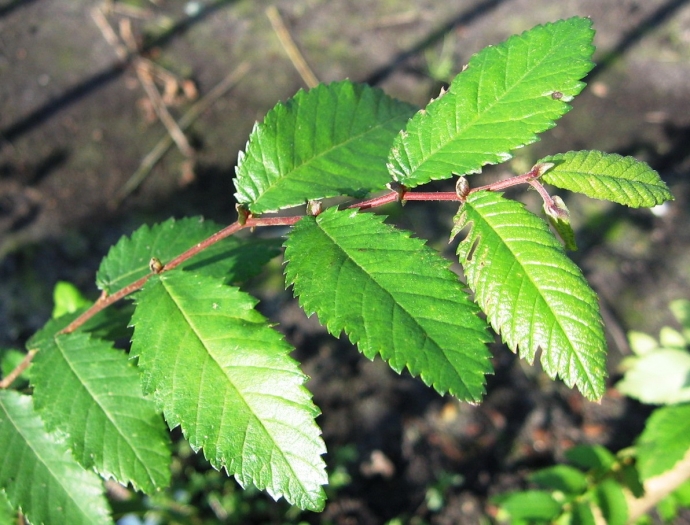Winged Elm
(Ulmus alata)
Winged Elm (Ulmus alata)
/
/

Ronnie Nijboer
CC0
Image By:
Ronnie Nijboer
Recorded By:
Copyright:
CC0
Copyright Notice:
Photo by: Ronnie Nijboer | License Type: CC0 | License URL: http://creativecommons.org/publicdomain/zero/1.0/deed.en | Uploader: MGA73bot2 | Publisher: Wikimedia Commons | Title: Ulmus_alata_071007c.jpg | Notes: |


























































Estimated Native Range
Summary
Ulmus alata, commonly known as Winged Elm or Wahoo, is a deciduous tree native to a variety of habitats including open woodlands, forest edges, and along streams throughout the southeastern and south-central United States. It is often found in areas with disturbed soil such as old fields and forest clearings, where it can become weedy. The tree typically grows to about 43 feet (13 meters) in height and width, but can reach up to 86 feet (26 meters) on fertile alluvial soils. The Winged Elm is distinguished by its unique corky wings that develop along the branches, and its leaves turn a bright yellow in the fall, adding seasonal interest.
The Winged Elm is valued for its adaptability to a wide range of soil conditions, including tolerance to temporary ponding and its ability to grow in less fertile soils. It is often used in urban settings due to its moderate size and attractive bark. However, its slow growth rate and the difficulty in controlling its spread in certain areas can be drawbacks. In cultivation, it thrives in full sun to partial shade and requires medium amounts of water, with a preference for well-drained soils. While it is not commonly afflicted by serious diseases, it can be susceptible to Dutch elm disease. Its invasive potential should be considered when planting outside of its native range.CC BY-SA 4.0
The Winged Elm is valued for its adaptability to a wide range of soil conditions, including tolerance to temporary ponding and its ability to grow in less fertile soils. It is often used in urban settings due to its moderate size and attractive bark. However, its slow growth rate and the difficulty in controlling its spread in certain areas can be drawbacks. In cultivation, it thrives in full sun to partial shade and requires medium amounts of water, with a preference for well-drained soils. While it is not commonly afflicted by serious diseases, it can be susceptible to Dutch elm disease. Its invasive potential should be considered when planting outside of its native range.CC BY-SA 4.0
Plant Description
- Plant Type: Tree
- Height: 30-50 feet
- Width: 25-40 feet
- Growth Rate: Moderate
- Flower Color: N/A
- Flowering Season: Spring
- Leaf Retention: Deciduous
Growth Requirements
- Sun: Full Sun, Part Shade
- Water: Medium
- Drainage: Fast, Medium, Slow
Common Uses
Bank Stabilization, Bee Garden, Bird Garden, Butterfly Garden, Deer Resistant, Drought Tolerant, Edible*Disclaimer: Easyscape's listed plant edibility is for informational use. Always verify the safety and proper identification of any plant before consumption., Fire Resistant, Hedges, Salt Tolerant, Street Planting
Natural Habitat
Variety of habitats including open woodlands, forest edges, and along streams
Other Names
Common Names: Wahoo
Scientific Names: , Ulmus alata, Ulmus americana subsp. alata, Ulmus americana var. alata,
GBIF Accepted Name: Ulmus alata Michx.